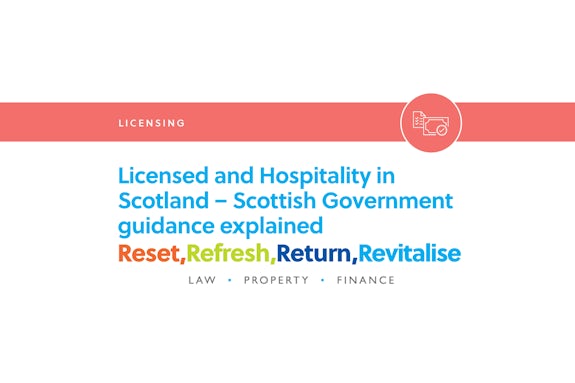By Gilson Gray
March 5, 2021

On Friday 14th August the Scottish Government put in place new restrictions such as no background music and also made the collection of data from those entering your premises law. Operators who fail to properly collect and retain data can now be liable to a fine. The guidance and new law applies from 14 August 2020, until further notice, so not much warning was given.
The law and guidance applies to business operating in the hospitality sector which includes public houses, restaurants, hotels and cafes. That includes operations situated inside bigger premises such as cafes within shops, garden centres, visitor attractions and similar. It applies to both indoor and outdoor spaces.
The recording of customer and visitor contact details is now mandatory and must be implemented in all hospitality premises. This includes not only customers but also contractors, delivery personnel and similar. This is now law and failure to implement this could result in a fine.
A full risk assessment is obligatory. Measures to protect staff, workers, visitors and the public must be carried out by all those operating in the hospitality sector. Staff training in Covid-19 must be done and should be put in place if not already completed. If you need assistance with risk assessments or staff training please contact me.
Risk-based approach
All businesses must undertake a risk assessment to determine what adjustments are required to operate safely. This means revising the risk assessment previously carried out. Fewer than 5 employees still means you do not need a written risk assessment but it is better to have something written down. We can help with styles and guidance.
No background music:
No background music or DJ’s are now allowed. TV screens must be on mute – subtitles can be on. If patrons become noisy, shout or sing this has to be challenged and they must be asked to be quiet. Signage is suggested by the Scottish Government to manage customer noise levels.
No queuing:
No queuing is allowed inside premises. This includes at bars or ordering stations. The Scottish Government does not address how this is to be managed when there are patrons waiting to access toilets inside premises which are already on a one on/ one out restricted numbers basis. It seems queuing can still be in place here but only if monitored and 2 metre distancing is maintained. Wearing of masks in these areas is encouraged. If a number of customers turn up at premises at the same time and require to be checked in, they must queue outside with physical distancing. They can no longer queue inside.
For take-away premises, queueing must be managed with physical distancing.
Mandatory collection of customer/visitor contact details to support Test and Protect – you can find out further information on this by clicking here
One metre physical distancing
Premises must ensure 1 meter distancing is adhered too between groups and layouts should be reviewed regularly to ensure the 1m distance is maintained between seating back to back and or side to side using physical separators and one way systems where necessary. Signage must be in place to advise customers they are in a 1 metre zone.
Cleaning and hygiene arrangements
Cleaning and hand sanitisers should be in place in every premises.
Limits to households mixing indoors and outdoors
The limits on households mixing indoors and outdoors must be taken into account by premises when accepting bookings or allowing groups access to the premises. Staff should enquire as to the make-up of groups and the numbers. As at today’s date, the limits remain 8 people from up to 3 different households indoors and 15 people from up to 5 different households outdoors.
Face coverings for staff
Face coverings for customers is not a requirement but is recommended where physical distancing may be difficult. They should be made available for staff particularly in front-of-house roles. The premises’ risk assessment for the front of house staff should indicate what barriers or face coverings are in place to minimise passing the virus. The latest science indicates that face shield/visors are not effective barriers and the guidance states face masks should be worn along with any such shield/visor.
Ventilation
Premises must consider if they have adequate ventilation and if any improvements are required.
Key information and training for staff
Notices to explain to customers what measures are in place and re privacy, access etc. are recommended and staff training is required. If you need staff training carried out, please contact me for course details. These can be provided immediately and are accessed online so there is no delay. Both should be included in the premises’ risk assessment.
Reasonable measures:
When deciding if measures are reasonable, operators can consider:
Enforcement
Police Scotland and local authorities have powers to enforce the restrictions on premises. Where non-compliance is posing a risk to public health, a prohibition notice may be served. Where provisions such as collection of data are now law, fines may be given.
Review
The Regulations are reviewed every 3 weeks and the Scottish Executive has indicated it will consdier with experts whether noise levels can be set to allow some background music to be played as part of a future review.
Please do not hesitate to call or email me if I can assist further.
To find out more about our Licensing services, please click here
The information and opinions contained in this blog are for information only. They are not intended to constitute advice and should not be relied upon or considered as a replacement for advice. Before acting on any of the information contained in this blog, please seek specific advice from Gilson Gray.

Karen is a solicitor in our Licensing Team specialising in Liquor and Civic Licensing including Short Term Let Licensing. Karen assists and advises our Licensing clients across the country with all forms of licensing matters.